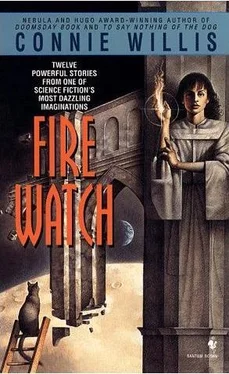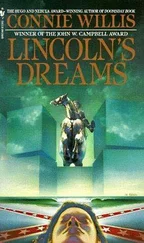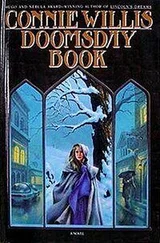“No,” I said coldly. “I wouldn’t.”
None of this proves anything. He gave away nothing, except perhaps the name of an artificial, and I can hardly go to Dean Matthews and accuse Langby of reading aloud.
I waited till he had finished in the choir and gone down to the crypt. Then I lugged one of the sandbags up to the roof and over to the chasm. The planking has held so far, but everyone walks gingerly around it, as if it were a grave. I cut the sandbag open and spilled the loose sand into the bottom. If it has occurred to Langby that this is the perfect spot for an incendiary, perhaps the sand will smother it.
November 21— I gave Enola some of “uncle’s” money today and asked her to get me the brandy. She was more reluctant than I thought she’d be, so there must be societal complications I am not aware of, but she agreed.
I don’t know what she came for. She started to tell me about her brother and some prank he’d pulled in the tubes that got him in trouble with the guard, but after I asked her about the brandy, she left without finishing the story.
***
November 25— Enola came today, but without bringing the brandy. She is going to Bath for the holidays to see her aunt. At least she will be away from the raids for a while. I will not have to worry about her. She finished the story of her brother and told me she hopes to persuade this aunt to take Tom for the duration of the Blitz but is not at all sure the aunt will be willing.
Young Tom is apparently not so much an engaging scapegrace as a near criminal. He has been caught twice picking pockets in the Bank tube shelter, and they have had to go back to Marble Arch. I comforted her as best I could, told her all boys were bad at one time or another. What I really wanted to say was that she needn’t worry at all, that young Tom strikes me as a true survivor type, like my own tom, like Langby, totally unconcerned with anybody but himself, well-equipped to survive the Blitz and rise to prominence in the future.
Then I asked her whether she had gotten the brandy.
She looked down at her open-toed shoes and muttered unhappily, “I thought you’d forgotten all about that.”
I made up some story about the watch taking turns buying a bottle, and she seemed less unhappy, but I am not convinced she will not use this trip to Bath as an excuse to do nothing. I will have to leave St. Paul’s and buy it myself, and I don’t dare leave Langby alone in the church. I made her promise to bring the brandy today before she leaves. But she is still not back, and the sirens have already gone.
November 26— No Enola, and she said their train left at noon. I suppose I should be grateful that at least she is safely out of London. Maybe in Bath she will be able to get over her cold.
Tonight one of the ARP girls breezed in to borrow half our cots and tell us about a mess over in the East End where a surface shelter was hit. Four dead, twelve wounded. “At least it wasn’t one of the tube shelters!” she said. “Then you’d see a real mess, wouldn’t you?”
November 30— I dreamed I took the cat to St. John’s Wood.
“Is this a rescue mission?” Dunworthy said.
“No, sir,” I said proudly “I know what I was supposed to find in my practicum. The perfect survivor. Tough and resourceful and selfish. This is the only one I could find. I had to kill Langby, you know, to keep him from burning down St. Paul’s. Enola’s brother has gone to Bath, and the others will never make it. Enola wears open-toed shoes in the winter and sleeps in the tubes and puts her hair up on metal pins so it will curl. She cannot possibly survive the Blitz.”
Dunworthy said, “Perhaps you should have rescued her instead. What did you say her name was?”
“Kivrin,” I said, and woke up cold and shivering.
December 5— I dreamed Langby had the pinpoint bomb. He carried it under his arm like a brown paper parcel, coming out of St. Paul’s Station and around Ludgate Hill to the west doors.
“This is not fair,” I said, barring his way with my arm. “There is no fire watch on duty.”
He clutched the bomb to his chest like a pillow. “That is your fault,” he said, and before I could get to my stirrup pump and bucket, he tossed it in the door.
The pinpoint was not even invented until the end of the twentieth century; and it was another ten years before the dispossessed communists got hold of it and turned it into something that could be carried under your arm. A parcel that could blow a quarter mile of the City into oblivion. Thank God that is one dream that cannot come true.
It was a sunlit morning in the dream, and this morning when I came off watch the sun was shining for the first time in weeks. I went down to the crypt and then came up again, making the rounds of the roofs twice more, then the steps and the grounds and all the treacherous alleyways between where an incendiary could be missed. I felt better after that, but when I got to sleep I dreamed again, this time of fire and Langby watching it, smiling.
***
December 15— I found the cat this morning. Heavy raids last night, but most of them over toward Canning Town and nothing on the roofs to speak of. Nevertheless the cat was quite dead. I found him lying on the steps this morning when I made my own, private rounds. Concussion. There was not a mark on him anywhere except the white blackout patch on his throat, but when I picked him up, he was all jelly under the skin.
I could not think what to do with him. I thought for one mad moment of asking Matthews if I could bury him in the crypt. Honorable death in war or something. Trafalgar, Waterloo, London, died in battle. I erded by wrapping him in my muffler and taking him down Ludgate Hill to a building that had been bombed out and burying him in the rubble. It will do no good. The rubble will be no protection from dogs or rats, and I shall never get another muffler. I have gone through nearly all of uncle’s money.
I should not be sitting here. I haven’t checked the alleyways or the rest of the steps, and there might be a dud or a delayed incendiary or something that I missed.
When I came here, I thought of myself as the noble rescuer, the savior of the past. I am not doing very well at the job. At least Enola is out of it. I wish there were some way I could send St. Paul’s to Bath for safekeeping. There were hardly any raids last night. Bence-Jones said cats can survive anything. What if he was coming to get me, to show me the way home? All the bombs were over Canning Town.
December 16— Enola has been back a week. Seeing her, standing on the west steps where I found the cat, sleeping in Marble Arch and not safe at all, was more than I could absorb. “I thought you were in Bath,” I said stupidly.
“My aunt said she’d take Tom but not me as well. She’s got a houseful of evacuation children, and what a noisy lot. Where is your muffler?” she said. “It’s dreadful cold up here on the hill.”
“I…” I said, unable to answer, “I lost it.”
“You’ll never get another one,” she said. “They’re going to start rationing clothes. And wool, too. You’ll never get another one like that.”
“I know,” I said, blinking at her.
“Good things just thrown away,” she said. “It’s absolutely criminal, that’s what it is.”
I don’t think I said anything to that, just turned and walked away with my head down, looking for bombs and dead animals.
December 20— Langby isn’t a Nazi. He’s a communist. I can hardly write this. A communist.
One of the chars found The Worker wedged behind a pillar and brought it down to the crypt as we were coming off the first watch.
Читать дальше












